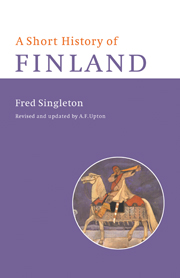Book contents
- Frontmatter
- Contents
- List of maps
- Dedication
- Preface
- 1 HISTORY OF FINLAND
- 2 FINLAND AND SWEDEN
- 3 FINLAND, SWEDEN AND RUSSIA IN THE EIGHTEENTH CENTURY
- 4 THE FINNISH NATIONAL AWAKENING
- 5 THE FINNISH ECONOMY IN THE NINETEENTH CENTURY
- 6 THE POLITICAL DEVELOPMENT OF FINLAND, 1863–I917
- 7 INDEPENDENT FINLAND
- 8 FINLAND IN THE SECOND WORLD WAR
- 9 FINLAND IN THE POST-WAR WORLD: THE POLITICAL SITUATION
- 10 THE ECONOMY OF FINLAND IN THE TWENTIETH CENTURY
- 11 THE SPIRIT OF FINLAND
- Appendices
- Bibliography by John J. Horton
- Index
11 - THE SPIRIT OF FINLAND
Published online by Cambridge University Press: 28 January 2010
- Frontmatter
- Contents
- List of maps
- Dedication
- Preface
- 1 HISTORY OF FINLAND
- 2 FINLAND AND SWEDEN
- 3 FINLAND, SWEDEN AND RUSSIA IN THE EIGHTEENTH CENTURY
- 4 THE FINNISH NATIONAL AWAKENING
- 5 THE FINNISH ECONOMY IN THE NINETEENTH CENTURY
- 6 THE POLITICAL DEVELOPMENT OF FINLAND, 1863–I917
- 7 INDEPENDENT FINLAND
- 8 FINLAND IN THE SECOND WORLD WAR
- 9 FINLAND IN THE POST-WAR WORLD: THE POLITICAL SITUATION
- 10 THE ECONOMY OF FINLAND IN THE TWENTIETH CENTURY
- 11 THE SPIRIT OF FINLAND
- Appendices
- Bibliography by John J. Horton
- Index
Summary
The Finns constitute one of the smallest nations in the world. There are only five million Finns living in the European homeland, and probably no more than another million who were born in Finland and who now reside abroad – in Sweden, the United States, Canada and Australia. To these must be added the families of settlers overseas who have retained some sense of identity as Finns, whether Finnish or Swedish speaking.
This small nation has made a substantial contribution to world civilization, out of all proportion to its numerical strength. Finland has been a national state for only seventy years, but for some centuries before its independence in 1917, its distinctive contribution to European and world culture can be traced. The range of Finnish activities in the arts, the world of learning, and even sport, covers a wide spectrum, from the music of Sibelius to the athletic prowess of Paavo Nurmi and the architectural genius of Alvar Aalto. Its impact was felt in pre-independence days during the century of Russian occupation and has grown and developed during the period of independence.
Finnish literature suffers from a major disability – the Finnish language, which is one of the little-known languages of the world. Although many Finnish authors have been translated into some of the major world languages, works of literature in translation seldom equal the originals. Nevertheless, Waltari, Sillanpää and Väinö Linna have found their way into the mainstream of twentieth-century European literature and even the extreme modernist Anselm Hollo has made a mark on both Finnish and English literature.
- Type
- Chapter
- Information
- A Short History of Finland , pp. 155 - 177Publisher: Cambridge University PressPrint publication year: 1998



